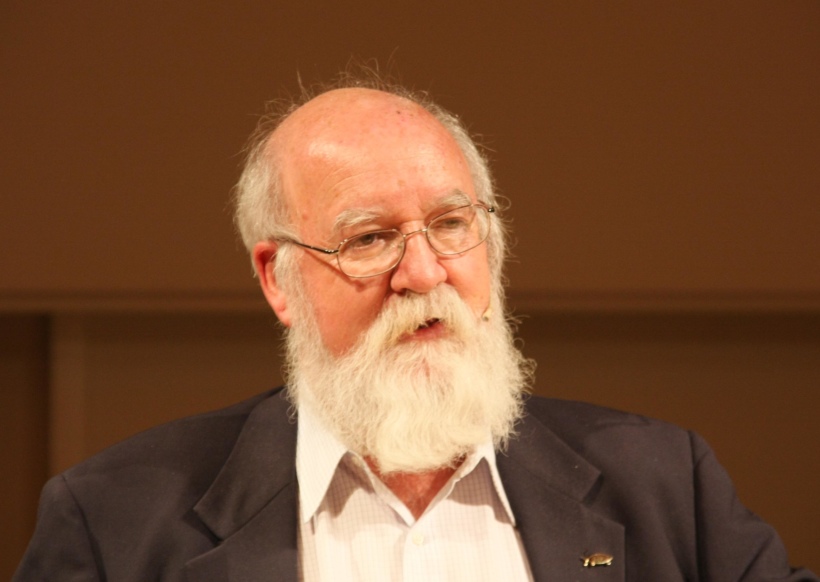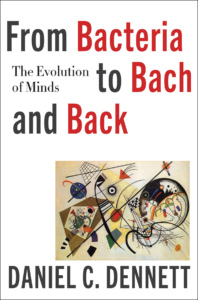News
From the Newsletter: Philosophical Provocation

(Dr. Dennett in 2008. Photo by: Mathias Schindler)
Daniel C. Dennett WF ’63 H on mind
What is this mind that senses and sorts, learns and creates, thinks and therefore is certain that it is? Despite centuries of speculation, religious belief, and philosophical consideration, one thing is certain, says Daniel Dennett WF ’63 H: “Everybody’s an expert,” but most of us have no idea of what our minds really do.
 “People are calmly prepared to be instructed about the chemical properties of calcium or the microbiological details of cancer,” Dr. Dennett writes in his latest book, From Bacteria to Bach and Back: The Evolution of Minds, “but they think they have a particular personal authority about the nature of their own conscious experiences that can trump any hypothesis they find unacceptable.”
“People are calmly prepared to be instructed about the chemical properties of calcium or the microbiological details of cancer,” Dr. Dennett writes in his latest book, From Bacteria to Bach and Back: The Evolution of Minds, “but they think they have a particular personal authority about the nature of their own conscious experiences that can trump any hypothesis they find unacceptable.”
Dr. Dennett is co-director of the Center for Cognitive Studies and the Austin B. Fletcher Professor of Philosophy at Tufts University. Over the past five decades, he has become one of the world’s best-known proponents of a physicalist view of consciousness—the contention that what we refer to as consciousness emerges strictly from biological and physiological processes. A leading contemporary thinker on the role of biology and evolution in cognition, free will, and religious belief, he is one of the “Four Horsemen”—along with Richard Dawkins, Sam Harris, and Christopher Hitchens—whose criticism of religious belief ignited widespread debate in 2007.
In the philosophy of mind, the physicalist stance typically opposes Descartes’ classic dualism of a metaphysical mind housed inside a material body—“the ghost in the machine,” in the famous phrase of Dr. Dennett’s mentor Gilbert Ryle. In his multiple drafts model of consciousness, Dr. Dennett famously argues, instead, that consciousness comprises many ongoing mental events and processes which influence each other but have no central author/editor.
Drawn to mathematics and logic early as an undergraduate at Wesleyan University, Dr. Dennett soon transferred to Harvard to work with the renowned naturalist philosopher W.V.O. Quine, whose Word and Object he sought to refute in his senior honors thesis. On the day he was to defend the thesis, Dr. Dennett wrote in Philosophy Now in 2008, “Quine showed up with maybe half a dozen single-spaced pages of comments. I knew at that moment that I was going to be a philosopher.”
During the interview season for the 1963 Woodrow Wilson Fellowships, Dr. Dennett pondered doctoral study at Berkeley or Harvard. Ultimately, however, Ryle’s work drew him to Oxford, and he declined the Woodrow Wilson award to go there.
There, in a meeting of a philosophical society, he wondered aloud how the science of the brain might inform the philosophy of mind. “My suggestion was met with incredulous stares,” Dr. Dennett recalled in 2008—but it also launched his fascination with neuroscience and other scientific disciplines. As his Harvard classmate (and 1958 Woodrow Wilson Fellow) Thomas Nagel notes in a 2017 New York Review of Books account of From Bacteria to Bach and Back, Dr. Dennett has a “gargantuan appetite for scientific knowledge.”
Indeed, across his 18 books, Dr. Dennett’s work has engaged such fields as evolutionary biology, chemistry, computer science, physics, and linguistics, through such volumes as Consciousness Explained, Darwin’s Dangerous Idea, Sweet Dreams: Philosophical Obstacles to a Science of Consciousness, and Breaking the Spell: Religion as a Natural Phenomenon. His eclectic, relatively accessible, even playful style has made several of Dr. Dennett’s books best-sellers; Darwin’s Dangerous Idea was also a finalist for a National Book Award and the Pulitzer Prize.
In From Bacteria to Bach and Back, Dr. Dennett paints expressions of human creativity as their own “intelligent design,” emerging naturally from the many “twigs on the Tree of Life” that have preceded them. All the necessary biological and cultural preconditions, he argues, have yielded such geniuses as Bach, Gaudí, and Alan Turing.
So is a central intelligence, he asks, a necessary precondition for learning and creativity? And what happens when the artifacts we create, like artificial intelligences, develop seeming sophistication? “The real danger, I think, is not that machines more intelligent than we are will usurp our role as captains of our destinies,” he writes, “but that we will over-estimate the comprehension of our latest thinking tools, prematurely ceding authority to them far beyond their competence.”
It is the latest provocative question from one of contemporary philosophy’s great provocateurs—a role Dr. Dennett seems to enjoy.
###
This story appeared in the fall/winter 2017 issue of Fellowship, the newsletter of the Woodrow Wilson Foundation. To see the full newsletter, click here.

